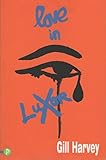
Price: £5.99
Publisher: Piccadilly Press
Genre: Fiction
Age Range: 14+ Secondary/Adult
Length: 192pp
Buy the Book
Love in Luxor
The title of Harvey’s book is misleading; it gives the impression of being one of the constantly proliferating and less than memorable ‘chick-lit’ genre, which it isn’t.
What it is, is a thought-provoking book which teenagers should read and pass on to their parents. This is because, on one level, it is a book about how newly adult young people feel, faced with both the freedoms and the responsibilities of that new adulthood. On that level, too, it is about how their parents feel about their children’s new status. And about how the two have to come to terms with their new relationship.
On a more important level, the book is about love across cultural lines. Having done with A-levels, Jen is out for a good time sunning herself in Luxor with her mates while waiting for university to start. She meets and falls in love with Ali, an Egyptian felucca operator. Ali, who is totally committed to earning not just his own living, but that of his family, falls in love with this English girl who is totally free of any such commitments.
Against all the warnings of her friends that Ali is just out to use her and the fears of her parents that she will get hurt, Jen plunges into a relationship which she feels is based on a real love for Ali and his real love for her. From their massively different backgrounds, the two young people try to make a go of it. The relationship doesn’t as much fail, as terminate because Jen feels that she cannot come to terms with Ali’s vastly different background.
A mature decision, but one which, one feels, is based on a deeper stereotype, an assumption that Jen will have to accept Ali’s way of life, rather than that she will be able to compromise between his and hers. This is perhaps the weakness of the book that it succumbs in the end, not to the extremely negative stereotype put forward by Jen’s friends and others, that Jen will be exploited by a ‘greedy Arab’ like so many ‘innocent’ Englishwomen before her, but to another viz. that the cultural divide between an Egyptian boy and an English girl is too great to be bridged.
Written in a modern, accessible style, the book is an enjoyable read, free from didactics. Unfortunately, it does, however, contain too many stereotypes, which detract from its primary aim to show that real love can develop between two young people in a setting which is not usually conducive to it, and that young people are capable of mature decisions about their relationships.



